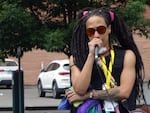
"Black people aren't the problem. Racism is the problem," Cat Hollis said at a PDX Stripper Strike protest held July 11, 2020, in central Portland.
Courtney Sherwood / OPB
Black strippers in Portland say they have long felt unwelcome at certain clubs.
Many clubs prefer to hire white strippers, people in the business report, and regularly exclude Black, indigenous and other dancers of color from their stages. Even if they are hired, dancers of color often make less money than their white coworkers, and are subject to microaggressions from club patrons and staff.
In response, BIPOC strippers in Portland have spent the last month speaking out about their experiences. They are pushing clubs to adopt demands for ending racial discrimination in their profession.
So far, nearly 30 clubs have agreed to their demands, which include implementing nondiscrimination policies and requiring cultural sensitivity training for club staff.
But organizers say about 15 are still holding out.
Cat Hollis, lead organizer of the Portland Stripper Strike and founder of the Haymarket Pole Collective, said strippers involved in the strike are refusing to work at clubs that do not adopt their demands.
Hollis told OPB's "Think Out Loud" that the idea for the strike arose partially from the boredom of being stuck at home during the coronavirus pandemic.
“I started a group chat of Black strippers, sending just memes and funny things to make each other smile,” she said. “It quickly turned into a conversation about how our experiences were all very similar."
Hollis said lots of Black strippers have walked in to audition at a club with a “hiring” sign in the window, only to be told the position had been filled.

"I am sick of making less than white dancers at clubs," Niko Black said at a march supporting the Portland Stripper Strike on July 11, 2020.
Courtney Sherwood / OPB
Hollis said there are also “dog whistle” terms that clubs consistently use to justify not hiring Black strippers.
“We found one of the terms is ‘Rock n’ Roll’ — that it’s just not their aesthetic, that they’re looking for a certain look, and you're not the floor model,” she said.
Many clubs also don’t allow strippers to dance to hip-hop music, Hollis said. If there is a disturbance at a club, they may ban hip-hop for weeks afterward, claiming that it brings in “the wrong sort of crowd.”
“But the wrong sort of crowd are people who look like me,” Hollis said.
Hollis said she and other Black strippers felt unheard by club staff and coworkers who were posting in support of Black Lives Matter online, but dismissing Black strippers’ experiences with racism and discrimination in the workplace.
She heard club employees say that the lack of diversity in their strippers was due to a lack of Black and Brown dancers in Portland.
“That’s just not true, we do exist,” Hollis said. “It was really upsetting to hear from my coworkers that I didn’t exist.”
It inspired Hollis and other Black dancers to come together, and speak out with the Portland Stripper Strike.
As their numbers increased, clubs grew more open to listening. But some were still hesitant about their demands. Many didn’t feel there had been an incident of racism at their club.
But Hollis said more came on board as dancers pointed out how that was a positive. She said the demands presented an opportunity for their industry to be a leader on racial justice in Portland.
“Even if they haven't had an incident in the past, it's really good to have proactive policies in place to prevent future incidents,” Hollis said. “There needs to be proactive language and there needs to be proactive training to prevent further incidents. We can’t change the past, but we also can’t heal a wound if we don't look at it.”
Hollis wants club employees to undergo cultural sensitivity training so they can learn to deescalate racially-based incidents, and recognize how implicit biases may lead them to unintentionally harm BIPOC dancers.
“It’s just setting a really great example that if strippers and managers can get together and put proactive policy in place, why can't a coffee shop, or a yoga studio, or the Portland Police Department?” Hollis said.

A sign from the PDX Stripper Strike protest held July 11, 2020, in central Portland.
Courtney Sherwood / OPB
The Portland Stripper Strike has been marching every week to build the momentum of their movement, and keep the pressure on clubs that have not yet agreed to their demands.
And as clubs reopen for socially distanced business, Hollis said club patrons can also show solidarity.
“We do encourage people to go out and tip brown butts,” she said. “Definitely go into your local strip clubs, ask them what their nondiscrimination policy is ... and if their answer is satisfactory, please stay and spend some money.”